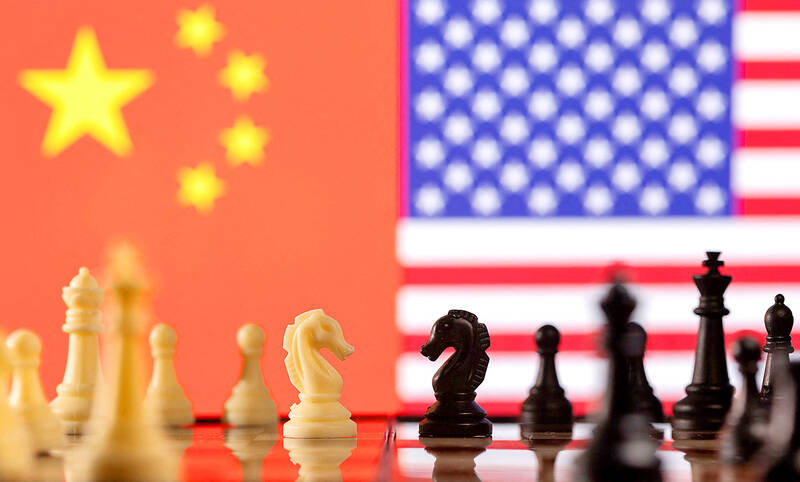China might intensify “gray zone” activities to achieve a “political and strategic breakthrough” in the Indo-Pacific region as the US and Japan hold key elections, a national security official said.
The US presidential election is scheduled for November and Japan’s Liberal Democratic Party’s leadership election — likely to decide the country’s next prime minister — is scheduled for Sept. 27.
Speaking on condition of anonymity, the official said the distraction caused by the elections would embolden Beijing to initiate fresh coercive measures against Taiwan, Japan and the Philippines.

Photo: Reuters
China is focused on using legal and cognitive warfare to maximize the pressure it can create without triggering a military conflict, a strategy Beijing is unlikely to deviate from, they said.
Beijing’s provocative actions near its neighbors are part of a long-standing strategy to penetrate the first island chain, the official said, referring to the string of archipelagos from northeast Japan through Taiwan, the Philippines and Indonesia.
Strategic competition between the US and China has escalated into a global contest between rivaling alliances, a situation that would not be affected by changes to Washington’s or Toyko’s leadership, they said.
Western economic sanctions and technology restrictions are having an effect even as the Chinese government struggles to contain a deepening economic crisis, the official said.
To regain the initiative, Beijing must make up the economic and technological losses by advancing on other fronts, such as improving its diplomatic and geopolitical posture, they said.
That requires a two-faced strategy of playing a mediator in the Russia-Ukraine and Israel-Hamas conflicts, while stepping up its harassment of neighboring countries in increasingly aggressive shows of force, they said.
Chinese President Xi Jinping (習近平) has a political incentive to dispel the perception of China’s diminished power by taking on an assertive foreign policy stance, the official added.
The renewed aggressive posture includes military activities around Taiwan, which have become more frequent, larger in scope, and involve an ever-increasing number and types of platforms, they said.
The Chinese People’s Liberation Army’s display of its capability to reach beyond the first island chain reflects Beijing’s strategic aims to compete with the West, they said.
It was not a coincidence that White House National Security Adviser Jake Sullivan’s visit to Beijing last month was followed by an intrusion into Japanese airspace and seas by Chinese craft, they said.
The aggressive behavior was consistent with China’s actions near Taiwan and the Philippines, and spoke to the nature of Sullivan’s visit, which was not a routine diplomatic house call, but a de-risking mission, the official said.
Sullivan likely gave Beijing a clear understanding of Washington’s bottom line, they said.
The US official met Xi, Chinese Minister of Foreign Affairs Wang Yi (王毅) and Zhang Youxia (張又俠), vice chairman of the Central Military Commission, but did not meet with Chinese Minister of National Defense Dong Jun (董軍), they said.
Xi’s interactions with the Chinese military have been rife with tension, the official said, adding that “anti-corruption” purges made him fear disloyalty more than it damaged the morale of the armed forces.
The Chinese leader’s authority is “slowly, but surely eroding,” he said.

The Executive Yuan yesterday announced that registration for a one-time universal NT$10,000 cash handout to help people in Taiwan survive US tariffs and inflation would start on Nov. 5, with payouts available as early as Nov. 12. Who is eligible for the handout? Registered Taiwanese nationals are eligible, including those born in Taiwan before April 30 next year with a birth certificate. Non-registered nationals with residence permits, foreign permanent residents and foreign spouses of Taiwanese citizens with residence permits also qualify for the handouts. For people who meet the eligibility requirements, but passed away between yesterday and April 30 next year, surviving family members

The German city of Hamburg on Oct. 14 named a bridge “Kaohsiung-Brucke” after the Taiwanese city of Kaohsiung. The footbridge, formerly known as F566, is to the east of the Speicherstadt, the world’s largest warehouse district, and connects the Dar-es-Salaam-Platz to the Brooktorpromenade near the Port of Hamburg on the Elbe River. Timo Fischer, a Free Democratic Party member of the Hamburg-Mitte District Assembly, in May last year proposed the name change with support from members of the Social Democratic Party and the Christian Democratic Union. Kaohsiung and Hamburg in 1999 inked a sister city agreement, but despite more than a quarter-century of

Taiwanese officials are courting podcasters and influencers aligned with US President Donald Trump as they grow more worried the US leader could undermine Taiwanese interests in talks with China, people familiar with the matter said. Trump has said Taiwan would likely be on the agenda when he is expected to meet Chinese President Xi Jinping (習近平) next week in a bid to resolve persistent trade tensions. China has asked the White House to officially declare it “opposes” Taiwanese independence, Bloomberg reported last month, a concession that would mark a major diplomatic win for Beijing. President William Lai (賴清德) and his top officials

‘ONE CHINA’: A statement that Berlin decides its own China policy did not seem to sit well with Beijing, which offered only one meeting with the German official German Minister for Foreign Affairs Johann Wadephul’s trip to China has been canceled, a spokesperson for his ministry said yesterday, amid rising tensions between the two nations, including over Taiwan. Wadephul had planned to address Chinese curbs on rare earths during his visit, but his comments about Berlin deciding on the “design” of its “one China” policy ahead of the trip appear to have rankled China. Asked about Wadephul’s comments, Chinese Ministry of Foreign Affairs spokesman Guo Jiakun (郭嘉昆) said the “one China principle” has “no room for any self-definition.” In the interview published on Thursday, Wadephul said he would urge China to